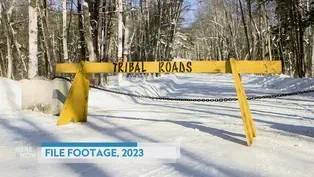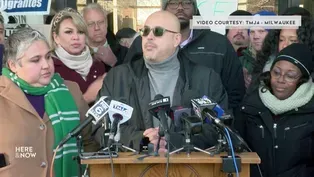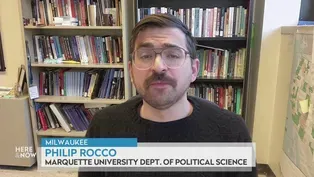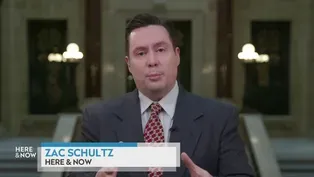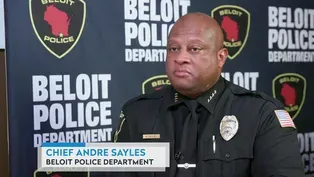Here and Now
Here & Now for January 17, 2025
Season 2300 Episode 2327 | 26m 47sVideo has Closed Captions
Watch the entire episode of Here & Now for January 17.
Watch the entire episode of Here & Now for January 17.
Problems with Closed Captions? Closed Captioning Feedback
Problems with Closed Captions? Closed Captioning Feedback
Here and Now is a local public television program presented by PBS Wisconsin
Here and Now
Here & Now for January 17, 2025
Season 2300 Episode 2327 | 26m 47sVideo has Closed Captions
Watch the entire episode of Here & Now for January 17.
Problems with Closed Captions? Closed Captioning Feedback
How to Watch Here and Now
Here and Now is available to stream on pbs.org and the free PBS App, available on iPhone, Apple TV, Android TV, Android smartphones, Amazon Fire TV, Amazon Fire Tablet, Roku, Samsung Smart TV, and Vizio.
Providing Support for PBS.org
Learn Moreabout PBS online sponsorshipIllnesses are climbing, reaching new peaks.
Public officials speak to their communities about immigration fears and how shared revenue reform fell short.
It's "Here& Now" for January 17.
[MUSIC] >> Funding for "Here& Now" is provided by the Focus Fund for Journalism and Friends of PBS Wisconsin.
>> Even a casual observer could conclude the relationship between the Republican legislature and the Democratic governor is dysfunctional in Wisconsin.
Long stretches where they don't talk to each other, lawsuits, vetoes, and end arounds to get their ways.
Now, the very balance of power between the legislature and the executive branch is in the hands of the Wisconsin Supreme Court with a series of cases having to do with whether administrative rules can be effectively vetoed by the legislature.
It's a lot to unpack, and here to do it, senior political reporter Zach Schultz, who joins us from the Supreme Court.
Hi, Zach.
Hello, Fred.
So first describe the kinds of rules and over what that we're talking about.
>> Well, the particular cases the Supreme Court heard this week, one of them was a rule about building codes.
And another rule had to do with a ban on conversion therapy, which is a type of therapy that tries to convince LGBTQ people that they are actually straight people.
And the state wanted to ban that.
And it's a committee in the legislature that Waukesha the Joint Committee for the Review of Administrative Rules.
It's a small committee with just a handful of members that can eventually put a hold on any of these rules coming out of administrative agencies and stop them from taking effect.
And when they do that, it's in effect, a legislative veto over administrative power.
And the Supreme Court is trying to weigh whether that's too much, whether that's actually allowed under the Constitution, and where that balance of power should reside.
>> So what has the Republican majority joint Committee on Review of these rules been able to do with some of Evers authority to set various rules?
>> Well, they basically have been able to put them on hold.
They have various authority.
When a rule goes into place, they can call the committee into action and they can hold the rule.
They can suspend it for a short amount of time, or they can suspend it for up to the full two year legislative cycle and then come back into the next session and suspend it again, which effectively creates a permanent suspension of the rule.
All they have to do is introduce a bill in the legislature that would overrule the rule, and that gets put on the table, it gets held and it has a hearing committee goes nowhere.
And effectively the rule is suspended.
The ban on conversion therapy, for instance, was first introduced in 2020, and it's only been in effect for a handful of weeks over the nearly five years since then.
Because Jcar keeps coming in and suspending it, it's in effect for the moment.
Right now.
But starting tomorrow, they can come back into session and put a hold on that rule, and then it will be suspended for as long as they want, possibly the next two years.
>> So a potential swing vote on the court in the way of justice, Bryan Hagedorn said during oral arguments that this decision is especially consequential for the operation of government.
Describe how.
>> Well, the kind of goes back to the bedrock of how we create laws.
The legislature could pass a law, the governor can veto it.
If the governor signs it.
Often the law is broad, and then there are agencies.
The DNR or the Department of Health and Family Services.
They have to create rules that carry out how those laws apply to businesses and people throughout the state.
Those rules effectively have the power of law behind them, and often they can become very granular and specific.
And sometimes it takes years to promulgate or create that rule and put it into place.
But then this legislative committee can come back and veto that rule and just send it back, and it goes nowhere.
So it's a legislative veto on administrative power.
If the Supreme Court decides that that no longer applies, then the rules from the administration go into effect, essentially with the power of law.
And that could reshape what the legislature writes into their own laws.
And that balance of power, of how the two branches of government work together.
allowed such power under the Wisconsin Constitution or other courts case precedent?
>> Well, the one that they're looking at the most is a Supreme Court decision from 1992 called Martinez.
And the question is whether they should overturn that rule or just adjust it slightly, because the power of this committee did grow in the Walker era, he gave them more expansive powers to hold and suspend some of these rules for longer.
But even Hagedorn in his comments from during oral arguments, said that there really is no basis for this relationship in the Constitution.
He called it a gentleman's agreement between the two branches of government, of how they would go about doing it, because since 1992, when the legislature has created laws, they've done it with the understanding that when it comes to creating rules under that law, of how it would be applied, the legislature would have some sort of say over what those rules said, and that could shift what kind of laws they write and what how old laws are interpreted under rules.
>> So this court could change the current balance of power as we know it.
>> Absolutely, fundamentally change, especially the way that the makeup has been in the six years we've had with Governor Evers in power and with Republicans in control of the legislature.
So certainly the next two years going forward.
But fundamentally beyond the timescale of this, because if they change the way this works, then that's a Supreme Court decision, just like Martinez was on the books for 30 some years.
This could be on the books for generations to come.
Future administrations, either Republican or Democratic governors and legislatures of either party, would be under this same system, having to figure out how does it apply, how do they write a law and how do they create a rule that is fair for everyone?
also released a decision on whether the names and addresses of people deemed incompetent to vote should be made public.
What did they do with that case?
>> Essentially, the Supreme Court of Appeals.
It's kind of a convoluted case.
The essence of it is whether a conservative voter interest group could get access to the records of all those voters, all those people in the state that are deemed incompetent to vote, and whether they could then check those names against the voter registration rolls to determine if someone was voting on their behalf, if they're not supposed to be a court of appeals.
And Madison said, no, you don't.
You don't have a right to those those are privacy issues.
A second court of appeals in Waukesha, a conservative one, said, no, we think you have a right to those.
The Supreme Court kicked it back and said, you can't overrule one Supreme 1 appeals court.
Do it right, and then we'll decide if we take the case properly.
So for right now, they don't have access to those records.
That's the status quo for the moment.
>> All right.
Well thank you.
Thank you for all your reporting from the Wisconsin High Court.
Zac Schultz.
Thank you.
Turning to health hospitals around the state are filling up.
And the first flu related pediatric death has occurred.
This as respiratory viruses are peaking, particularly among infants, up to four years old.
>> They tend to have immune systems that are not experienced with viruses.
They tend to be smaller.
So for example, respiratory syncytial virus or RSV can cause a lot of secretion and produce difficulty breathin.
And almost with any of the viruses, we see a lot more fever with the first or second time exposure as compared to those of us older who've seen many of these viruses many, many times.
So the fact that Wisconsin has had one death in a child is fairly average for influenza, but is very tragic because most of these children don't have underlying medical problems, and most of them have not been vaccinated.
We're watching very, very closely for this avian influenza and the potential that it could jump into humans.
As of today, we know of at least three cases across the country where we don't know where the individual contracted the virus from.
Most of the other cases have been from dairy cattle or from poultry, but it's really worrisome.
And I mentioned that simply because during the time that we have the regular influenza circulating, we have the potential for mixing within individuals and the production of different viruses that could attain the ability to spread human to human.
And so that's one of the biggest new concerns we have out there with the Trump administration assuming office this coming Monday, the president elect's promises of mass deportations has some communities on high alert.
>> Two Milwaukee alders raised concerns over a new Immigration and Customs Enforcement facility on the northwest edge of the city, meant to replace an aging facility downtown.
>> Although we are not certain what type of federal facility might be planned here for this location, or how vague some of this information is at times, I am firmly opposed to any expansion of ice type detention services in the city of Milwaukee.
[MUSIC] are scared.
This is the time to push back hard.
>> For its part, the agency has said there are no plans for a detention center at that location in Dane County.
Law enforcement let residents know their plans for interacting with immigrant populations.
>> Increased fear of mass deportations has already inhibited some members of our most vulnerable populations from reporting their victimization to law enforcement.
This reality perpetuates a cycle of violence.
And criminality that have a chilling effect on our entire community.
Our schools, workplaces, and neighborhoods become less safe when our neighbors and loved ones are afraid to report crimes and engage in our criminal justice system.
>> A bill in Washington would mandate immigration officers arrest and detain immigrants in the country illegally who are suspected of minor theft of $100 or more.
In Beloit, where the U.S. Census estimates, 10% of the population to be foreign born and 20% to be Hispanic, the police chief wrote an open letter to the city's 36,000 residents, saying officers do not seek out people who are undocumented, but consider immigration status only when a serious crime has been committe, impacting public safety.
The chief social media post has gone viral with strong feelings on both sides.
We sat down with Chief André Sayles and started by asking his reaction to the legislation.
>> It's one of those things where you have to really try to dive into it and wanting to look and learn more about what is the actual goal of the bill.
And when you're looking at some of those minor crimes, it's one of those things where when people are arrested for minor crimes, what are we doing?
We're overpopulating the jails and some of those offenses, especially with our illegal immigrants, as they say, are those things where we're holding people in jail for minor offenses to where we can also counsel them, talk to them about it, and then release them instead of holding them in spaces where our violent criminals need to be.
I think one of the biggest things is we're adding more work to an already stressful job.
A job that provides that here in the city of Beloit, we take roughly 57,000 calls a year, and that's over 1000 calls a week for our police officers, over 100 and something calls a day.
And when we're doing that, you're going to put more strain on our already strained law enforcement to now stay in these facilities with individuals, to hold them for ice instead of ice, giving guidance and saying, we will look at these certain crimes and we will be responsible for it.
You have federal government, state government and local government, and we're putting a lot more work on your local government to do, I believe a job that should be on the federal side.
>> How does that legislation square with your community policing philosophy?
>> It aligns with it to some point.
But at the same time, we want to be good stewards of the people of Beloit, our community members here in the city of Beloit.
So it's going to put that strain between our community members and the police department, and we've worked diligently to bring down that strain and to be inclusive to all, and to make sure that we're working for everyone, giving everyone a voice and an opportunity to have a relationship with our police department, to talk with our police department.
And if we fully dive into that, we're going to remove a great deal of people here in the city of Beloit.
>> When will your officers cooperate with Ice?
>> We will cooperate when we get further guidance.
When there are violent felon felons arrested in those situations, we will call Ice.
We will talk to them and say, hey, this is what we have.
What are our next steps?
If Ice were to come here and do a project, they typically call them a roundup.
What are we looking for?
Who are we looking for?
What have they done that meets that felony threshold?
And how can we be of assistance of that?
We're not saying that we don't want to be partners with Ice.
We're just saying we need further guidance.
We need further understanding.
And we're also going to need training.
>> So you wrote an open letter to residents in Beloit this month on this issue.
Why did you do that?
>> I thought as the leader of our police department and the leader of enforcing laws, I think everyone in our community needed to hear from me to hear our stance on it and to understand that we won't be going out and just randomly knocking on doors to say, we heard that this person in the home may be illegal.
We need to check your immigration status once again.
That's going to add more work to our officers.
That's going to prevent us from doing some of the things that we've done to build a better Beloit as far as making sure our roadways are safe, making sure that we're being partners of our students in the community because they are our future, making sure that we're handling the violent crime that Beloit has had a history of known for.
We are a city that went from having over 100 confirmed shootings in this city to where we're in the 20s now, and that is the hard work that the men and women of the police department has done with the help of our community members.
So if we tarnish that relationship, we're going to go back to those days of don't go to Beloit.
>> What has been the reaction from the community, the people that I know that live in the city of Beloit has had a positive reaction to the messag.
>> They appreciate me being transparent, explaining what we're going to do as a police department and how we're going to continue to cooperate with our community members.
But I think a lot of it has been probably a lot of people that's not from the city of Beloit, weighing in on some things that I would just say they probably really didn't understand, or they took bits and pieces of that message and created a bigger message.
reaction on the part of immigrants in your city?
>> I really haven't had too many conversations, but I did speak to one of our Hispanic population leaders in the city of Beloit, and she was very appreciative of the message that we put out and understood why I put that message out and understood that by me putting that message out, it received a little bit of stress from our Hispanic population in the city of Beloit.
And it's unfortunate that it seems that it's directly, directly pointed only at the Hispanic population.
But when you look at immigration, you have to look at all of the world.
You know, we have people from China that may be illegal immigrants.
El Salvador, you have people that are from the Philippines and things of that nature.
So I think the collective message is all that may be illegal.
Immigrants don't have to worry about us just knocking on their door, checking their immigration status.
If we get to a point to where they're involved in a serious crime, that may come up, but we're not just going to go out and ask for their immigration status.
>> So you said that you're waiting for guidance.
Yes.
On all of this.
And yet, what are your concerns given what has been roiling around in the headlines?
>> No concerns as of yet.
I'm a person that likes to sit back and wait and watch and look and get my own facts from documents that's provided for local law enforcement.
And if I have concerns out of that, then express those concerns to the person that may have sent it to us from the federal government that we think needs to change as a local law enforcement agency, or can you provide further guidance on what you're saying in these certain situations?
>> If the guidance and the laws say that you do, in fact have to interact with the immigrant population in this city by way of going door to door and asking for their documentation, you will uphold the law, I assume?
>> Yes, most definitely.
But once again, I'm going to make sure we are very detailed in our response to Ice or the federal government to make sure that our officers that are going to be held accountable for violating people's natural born rights, that may be legal citizens of the city of Beloit, but someone assumes that they're not.
So we want to make sure that we are doing things best, practice and making sure that we're getting the guidance from the federal government to make sure that we are upholding everyone's natural born rights.
Our thing is, we want to make sure that we are providing everyone an opportunity to feel safe in this community of Beloit, and to make sure that the victims are not continued to be victims of crimes that they refuse to report because they feel that we're going to check their illegal or their immigration status before we make a case against the person that they're calling on.
>> Chief, thanks very much.
>> Thank you for allowing the police department to get our message out.
Thank you.
>> In an emergency hearing, a federal judge in Madison this week told an assistant U.S. Attorney he was responsible for making sure the Lac du Flambeau band does not put up barricades blocking homeowners access on roads to their properties.
It's the latest back and forth between the tribe and dozens of non-tribal property owners whose land abuts reservation roadways.
The Lac du Flambeau had threatened to barricade the roads again as of Thursday, because the town had not made ongoing payments to the band for use of them.
It all stems from long standing and historical treaty agreements and disputes over tribal sovereign land rights.
Tribal leaders say the roads were built on their land more than 50 years ago, and the least to use them expired in 2014.
The tribe tried to renegotiate the leases and now seek nearly $10 million in payment.
A ruling in a federal lawsuit to settle the dispute is pending.
Wisconsin is sitting on a $4 billion surplus.
Some counties would like a bigger piece of that pie through the state's shared revenue back in 2023, a much heralded bipartisan shared revenue plan for local governments was passed, allowing Milwaukee to raise its sales tax to shore up services, while at the same time boosting state revenue.
Coming to locals across the state.
But now the richest county in the state, Waukesha County, is looking at a $5 million budget shortfall in 2025 and is beseeching the state to give more.
Marquette University Professor of political Science Philip Rocco is an expert in all of this, and he joins us now.
Thanks very much for being here.
>> Good to be with you.
>> So I thought that this 2023 shared revenue plan was a great deal for local governments.
What happened?
>> Well, it was a big deal, right?
It was the single largest increase in shared revenue that local governments had received since the early 2000.
But the reality is that compared to what cities, towns, villages and counties had lost since the early 2000.
Because the formula wasn't updated for inflation and because there were several big cuts to shared revenue.
It's really a fraction of what local governments and county governments had lost in inflation adjusted terms since the early 2000.
And at the same time, inflation has sort of proceeded a pace that raises the cost of services for local governments.
And so while it was by no means a small thing, there are still challenges that local governments around the state are facing.
>> Is it striking that a county like Waukesha County, regarded as the wealthiest in Wisconsin, would be in this position?
>> No, I don't think it's particularly surprising, in part because the shared revenue formula is not necessarily designed to advantage counties like Waukesha receives one of the largest or lowest shares in per capita aid among counties in the state.
At the same time, the pressures that are on counties and municipalities around the state are really pretty constant, regardless of their wealth.
So, for example, there are inflation pressures which raise the cost of doing things like sidewalk repair and street repair.
But at the same time, the property tax levy limit that the state sets has not been adjusted to sort of take account of those inflationary pressures.
And that really puts counties and municipalities in a squeeze position.
>> Is it your expectation that the state would do something around those levy limits?
>> I think that's possible.
I think that that is, if you talk to local officials, both in counties, municipalities, that's one of their key agenda items.
And so I would expect to see movement on that before.
I would expect to see movement on sort of increasing formula funding under act 12.
>> So other counties raised their state sales tax to fund needs.
And Waukesha wanted to.
What happened with that?
>> I think that was one of the things that helps explain the shortfall.
And maybe why Waukesha is in this position, which is like a lot of other counties.
There was a push to increase the sales tax by 0.5%, but there was, unlike in Milwaukee, where the business community was in favor of that measure, both for the county and the city.
In Waukesha County, the business community, the Chamber of Commerce really opposed that.
And so the legislation was pulled sort of at the last minute to reevaluate it.
particular so strapped?
>> Counties are important because they really pulled double duty in Wisconsin government.
They're both local governments in their own right that offer things on a discretionary basis to their residents.
But at the same time, they are service providers and agencies of the state.
And so they have a lot of responsibilities that they can't easily get out of.
And a lot of their budget is sort of spoken for by the state.
And so that especially in in conditions where there's sort of inflationary pressure that can put an additional vice grip, I think, on county finances.
And so when you look at what counties are asking for in the 2025 to 27 budget, what they're asking for is not additional shared revenue of the sort that that they got under act 12, but the sorts of special revenue programs or aid programs that help them to support the services that they provide on behalf of the state.
>> What are some examples of those services that they provide on behalf of the state that are different?
>> So there's all sorts of mental health services that counties are the sort of main provider of.
If you think about the state court system that really operates through counties, jails as well, are county functions.
But mandated in a way by the state.
And there's really a host of additional kind of mandatory programs that counties administer.
>> All right.
Professor Phillip Rocco, thanks very much.
We'll be looking at that next state budget to see what it holds.
Thank you.
>> Thank you.
>> For more on this and other issues facing Wisconsin, visit our website at PBS wisconsin.org and then click on the news tab on Wednesday.
Join us live at 7 p.m. On PBS.
Wisconsin and Wisconsin Public Radio for Governor Tony Evers, state of the State Address at the Capitol, along with the Republican response.
That's our program for tonight.
I'm Frederica Freyberg.
Have a good weekend.
>> Funding for "Here& Now" is provided by the Focus Fund for provided by the Focus Fund for Wisconsin.
Federal Judge Orders Lac du Flambeau Roads to Remain Open
Video has Closed Captions
A federal judge said Lac du Flambeau roads must remain open while a ruling is pending. (1m 1s)
Here & Now opening for January 17, 2025
Video has Closed Captions
The introduction to the January 17, 2025 episode of Here & Now. (1m 1s)
Local Officials Voice Concern Over Mass Deportation Plans
Video has Closed Captions
José Pérez and Ismael Ozanne speak to local concerns over mass deportation plans. (1m 43s)
Philip Rocco on Shared Revenue Shortfall Issues in Wisconsin
Video has Closed Captions
Philip Rocco on Wisconsin's 2023 shared revenue deal to boost local government funding. (5m 37s)
Seasonal Respiratory Viruses Are Peaking for Young Children
Video has Closed Captions
Seasonal respiratory viruses are spreading across Wisconsin as authorities monitor H5N1. (2m 1s)
Zac Schultz on Wisconsin's Separation of Powers Lawsuit
Video has Closed Captions
Zac Schultz on a Wisconsin Supreme Court case on administrative rules in state government. (6m 29s)
Chief Andre Sayles on Beloit Police and Immigration Status
Video has Closed Captions
Andre Sayles on policing practices toward undocumented immigrants in the city of Beloit. (11m 37s)
Providing Support for PBS.org
Learn Moreabout PBS online sponsorshipHere and Now is a local public television program presented by PBS Wisconsin
